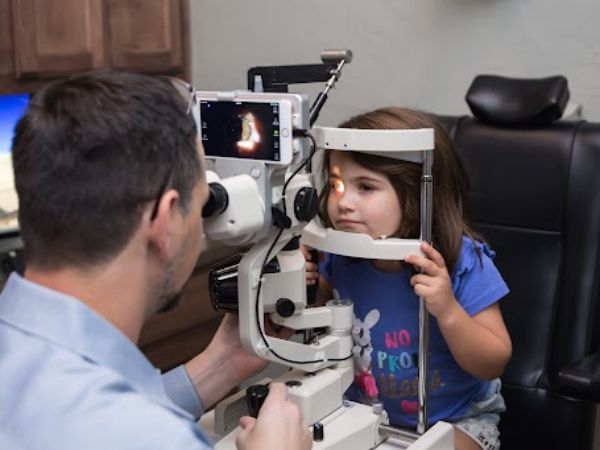We've got you covered...
Advanced Family Eye Care tries to offer coverage for as many insurance carriers as possible to guarantee that you are always eligible for insured treatments and consultation. Below is a list of the most recognized providers that we honor:
- VSP
- Sooner Care
- Medicare
- BCBS
- United Health Care
- Eye Med
- and many others
Frequently Asked Insurance Questions:
How much does a new patient's eye exam and contact lens evaluation cost without vision insurance coverage?
The cost for a new patient Comprehensive Eye Health Examination, Refraction (Glasses prescription), Including Digital Retinal Photography is $129. The Cost for a Contact Lens Fit/Evaluation is between $40.00 and $175.00 for a soft contact lens wearer. For Gas Permeable or Specialty Soft Contact Lens wearers, the cost is case-dependent.
Does my vision insurance cover LASIK or PRK?
Most insurance companies consider this procedure elective and not a covered benefit. Although, it is worth checking with your insurance company to find out what they will or will not cover. Some patients will be able to use their flexible spending account for this procedure.
What’s the difference between Medical Insurance and Routine Vision?
We can bill medical insurance for any examinations and treatments for visits that have a medical diagnosis. Examples would be eye infections, dry eye syndrome, and diabetes. Routine vision is considered one annual visit for a comprehensive eye health examination and refraction (glasses prescription). Most medical insurance plans do not cover routine vision, but it is sometimes offered as an additional benefit (carved out or sub-contracted) to another company.
It is important to note that almost all medical insurance providers do not provide routine vision coverage. Sometimes one medical insurer may use several different vision insurance providers depending on what plan your employer chooses. So if you are coming in for routine vision, providing only your medical insurance company’s name does not provide enough information – we need to know both.
BACK TO TOP
What does my vision plan (Ex. VSP, EyeMed) cover?
Your vision plan is intended for comprehensive well-eye exams. This includes a refraction to determine your eyeglass prescription and a thorough check for eye diseases/disorders. Most vision plans include coverage or discounts for eyeglasses, and/or for contact lens services and materials. There are literally hundreds of different plans with different benefits. Give our friendly insurance experts a call and we will help you determine your benefits.
BACK TO TOP
What do you mean by “verifying benefits”?
We do our best to contact your insurance provider(s) and find out if your coverage is active, what services are covered, if your deductible has been met, and what copays you will be charged. We are better able to estimate the charges you will be responsible for by verifying this information in advance of your appointment. Of course, we cannot guarantee coverage and may have to adjust your balance due as we receive EOBs (Explanations of Benefits) from your insurance company.
BACK TO TOP
What if my plan is out-of-network or I don’t have the information for my plan right now?
We are more than happy to help you submit claim forms for reimbursement and/or complete any documentation you made need. But if for any reason your insurance does not pay, you will be responsible for paying for all services at the time they are rendered.
BACK TO TOP
Does my insurance cover medical eye exams?
Vision plans do not cover medical eye exams or office visits. However, these services will be covered by your major medical insurance. These are the rules that are set by your insurance company. Even if your eye exam is billed to your medical insurance, you may still use a vision plan to purchase eyeglasses or contact lenses.
BACK TO TOP
What is Flex Spending (Cafeteria Plans)?
Flex spending is a program that allows you to put away pre-taxed dollars in an account for use on medical care, services, and materials. Generally, the money must be allotted the year before use and must be used by the end of the following year. It has the advantage of allowing you to spend tax-free dollars. But the money has to be spent by the end of the year or it is lost.
BACK TO TOP
What Can I Use Flex Spending On?
You can use flex spending on eyecare services, the purchase of glasses, contact lenses, LASIK, contact lens accessories, and vision therapy.
BACK TO TOP
Does my insurance cover glasses & contact lenses?
There are three most common ways that insurance works. One way is by giving an allotted amount to go towards glasses and/or contact lenses. Another way is a discount to be applied towards either the exam, the materials, or both. The third way is coverage on either an allowance of contact lenses or a basic pair of glasses, but usually not both.
BACK TO TOP
Why do I have to pay for an eyeglass prescription? Shouldn’t that be considered part of a routine eye exam?
Refraction is the process of determining the eye’s refractive error and testing for best-corrected vision or the need for corrective lenses (glasses or contacts). It is an essential part of an eye examination and is covered by vision insurance plans, such as VSP, Spectera, and Eye Med.
However, since refraction is considered vision care, it is NOT covered by Medicare or most medical insurance. If you do not have vision insurance, the fee for refraction is $35 and it is collected at the time of service. It is in addition to any copayment or deductible required by your insurance company—the co-pay or deductible is for the medical portion of your exam and is separate from and not included in the refraction fee.
BACK TO TOP
I have been wearing contacts for many years and I have never paid for a fitting in the past, why would I have to pay at your office when I just need a renewal on my prescription?
Contact lenses are medical devices placed on the eyes. They require expert fitting and conscientious care to maintain the healthy functioning of your eyes. Because the determination of contact lens prescription is not part of the usual eye examination, extra measurements including keratometry and/or corneal topography (corneal curvature and contour) are necessary to ensure proper centration and movement of the lenses. Contact lenses should be evaluated on an annual basis to ensure healthy corneal integrity, proper fit, optimal comfort, and adequate vision. Even if the contact lens prescription remains the same the following year, a contact lens refit fee applies.
BACK TO TOP
Does my insurance cover contact lens fittings?
Most insurances do not cover the fitting of contact lenses. Some vision insurance will allow the fitting to be taken out of the contact lens allowance. Some insurances will allow a discount to be taken off the contact lens fitting charges.
BACK TO TOP
If I have insurance, do I need to pay for my appointment upfront or will you bill the insurance company first and I pay the remaining amount?
You will be expected to pay only your copay at the time of your visit. After your claim has been processed by your insurance company, our office will send you a bill for any additional copay, coinsurance, deductible charges, or procedures that were not covered by your plan. If you have an HMO with which we are contracted and your insurance requires prior authorization/referral, we will need to have this on file before you can be seen. You will be expected to pay your copay at the time of your visit. After your claim has been processed by your insurance company, our office will send you a bill for any additional copay, coinsurance, deductible charges, or procedures that were not covered by your plan.
If you have traditional Medicare, you do not have to pay for anything upfront unless you are having a refraction or procedure that Medicare does not pay for. After Medicare has processed your claim, our office will send you a bill for any additional coinsurance, deductible charges, or procedures that were not covered by Medicare. If you have secondary insurance, we will forward your claim to your insurance company on your behalf. You will be responsible for any portion of your bill not covered by your secondary payer. If you have signed up for a Medicare Advantage plan, you may need prior authorization or a referral. You may also have a copay. You will be expected to pay your copay at the time of your visit.
After your claim has been processed by your insurance company, our office will send you a bill for any additional copay, coinsurance, deductible charges, or procedures that were not covered by your plan. All plans are different and we recommend that you call your insurance company ahead of time so you are aware of what your plan covers and what your coinsurance and deductible responsibilities may be. If you arrive for your appointment and we cannot verify your insurance coverage or authorization, you may pay in full at the time of your visit or reschedule your appointment.
BACK TO TOP
We would be happy to answer any questions that you may have about your insurance coverage. You may also want to consult with your insurance company or human resources department.















